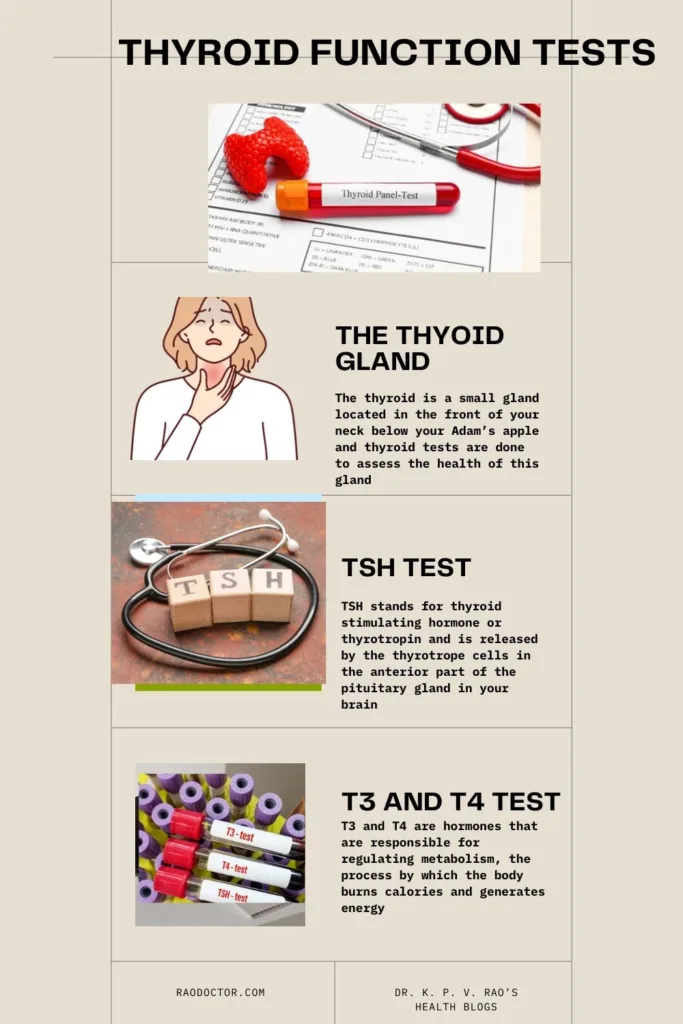Table of Contents
A Guide to Understanding Your Thyroid Tests Results
The thyroid is a small gland located in the front of your neck below your Adam’s apple and thyroid tests are done to assess the health of this gland.
It produces hormones that play a significant role in maintaining normal metabolism and function of almost every bodily system.
Because the thyroid has such a widespread influence on so many different functions, even subtle changes may have serious consequences over time.

Hypothyroidism and hyperthyroidism are common thyroid conditions with an incidence of approximately 1 in every 100 people. Both hypo- and hyperthyroidism can have serious implications on a person’s health, but fortunately, they are both easily treatable.
Read on to learn about the most common tests for diagnosing and monitoring your thyroid health as well as your own risk factors for developing thyroid dysfunction, no matter what your age!
What is a TSH test?
TSH stands for thyroid stimulating hormone or thyrotropin and is released by the thyrotrope cells in the anterior part of the pituitary gland in your brain.
The TSH test is a commonly used screening test that measures the level of TSH in the blood to determine if and how much your thyroid is functioning.
TSH levels in the blood can reveal a lot about what’s going on with your thyroid health. If your TSH levels are within the normal range, you likely have a healthy thyroid.
If your TSH levels are either below the normal range or above normal, you may have some thyroid dysfunction. Treatment depends on the cause and symptoms of thyroid dysfunction.
A TSH test may be ordered as part of an annual physical exam or as part of a routine blood panel.
Thyroid Function Tests
Thyroid function tests are used to determine whether someone has a thyroid condition or disease. There are many different tests for thyroid function, but the most commonly used are TSH, T3, and T4.
If your thyroid function tests come back abnormal, you may be told you have a thyroid problem. But without knowing what the numbers mean, it can be difficult to decide what to do next.
A basic understanding of how these tests work and what they measure can help you interpret your own results and know what to do next.
If your results come back abnormal, your doctor will explain what they mean and what you should do next.
T3 and T4 – Are your levels in the normal range?
The most common thyroid function tests are TSH, T3, and T4. T3 and T4 are the hormones produced by your thyroid. They are bound to the protein globulin for transporting it to various tissues.
T3 and T4 are hormones that are responsible for regulating metabolism, the process by which the body burns calories and generates energy. Your doctor may order one or both of these tests to assess your thyroid function.
If your levels are in the normal range, your thyroid is producing enough hormones to keep you healthy.
If your levels are out of range, it doesn’t necessarily mean that you have an overactive or underactive thyroid. It could just mean you have a thyroid issue that requires monitoring and treatment.
The Thyroid Tests Everyone Should Know – A Guide to Understanding Your Results Share on XFT3 and FT4- what are they
Free T3 and Free T4 are similar tests to T3 and T4, but they look at how much of the hormone is bound to protein.
The significance of doing a Free T3 or Free T4 test is to rule out the changes in TSH levels. In some instances, such as pregnancy, thyroglobulin- the protein that is bound to T3 and T4- increases. But free T3 and free T4 remain the same. Due to this, the TSH may rise giving a false impression of hypothyroidism.
T3 and T4 are bound to proteins (mainly thyroglobulin) in order to remain in the bloodstream for a longer period of time.
If the thyroid is healthy, about 80% of the T3 and T4 are bound to proteins. If the thyroid is not healthy, the percentage of bound T3 and T4 could be lower.
Normal values of thyroid function tests and their interpretations
Thyroid function tests are blood investigations. Here are the normal values to watch out for-
Table
| SR. NO. | NAME OF TESTS | UNITS OF TESTS |
|---|---|---|
| 1 | Normal TSH levels | 0.40 – 4.50 mIU/mL (milli-international units per liter of blood). |
| 2. | Normal T3 levels | 3.2-6.2pg/mL or 100 – 200 ng/dL (nanograms per deciliter of blood) |
| 3. | Normal T4 levels | 11-23 ng/dL or 5.0 – 11.0 ug/dL (micrograms per deciliter of blood) |
| 4. | Normal FT3 levels | 2.4-4.4pg/mL (picograms per milliliter of blood) |
| 5. | Normal FT4 levels | 622-2098pg/dL or 0.9 – 1.7 ng/dL (nanograms per deciliter of blood) |
Depending upon the methods of testing, different pathology labs may use different units. The units shown above are those used commonly by most labs.
If your TSH levels are in the normal range, you likely have a healthy thyroid.
If your TSH levels are either below the normal range or above normal, you may have some thyroid dysfunction.
If your T3 and T4 levels are in the normal range, your thyroid is producing enough hormones.
If they are slightly out of range, it doesn’t necessarily mean that you have an overactive or underactive thyroid. We term it as either sub-clinical hyper- or hypothyroidism. It could just mean you have a thyroid issue that requires monitoring and treatment.
Abnormal Thyroid function tests and their interpretations
Now that you know the normal range of all the thyroid tests, you can interpret as given below-
- If your TSH levels are above the normal range, that means your thyroid is underactive and producing too few hormones. You may be diagnosed with hypothyroidism. Treatment with thyroid hormone replacement is the mainstay of treatment for hypothyroidism.
- If your TSH levels are below the normal range, that means your thyroid is overactive and producing too many hormones. You may be diagnosed with hyperthyroidism. Hyperthyroidism is treated with medication that blocks the thyroid’s hormone production.
- If your T3 and T4 levels are lower than normal, you may have an underactive thyroid. If they are higher than normal, you may have an overactive thyroid.
Autoimmune Disease Risk Factors
Autoimmune diseases are caused by a breakdown of the immune system, when the body attacks and damages its own tissues and organs. This breakdown can happen because the body can no longer recognize its own tissues as “self”. This is called an immune response or immune dysregulation.
The thyroid is a gland at the front of your neck just below Adam’s apple that produces hormones that play a significant role in maintaining normal metabolism and function of almost every bodily system.
Because the thyroid has such a widespread influence on so many different functions, even subtle changes may have serious consequences over time.
The thyroid is one of the most common areas where autoimmune disease occurs. It is estimated that up to 20% of the American population has some level of autoimmune thyroid disease.
Useful resource-Thyroid Function Tests
Conclusion
The thyroid is a small gland located in the front of your neck below your Adam’s apple. It produces hormones that play a significant role in maintaining normal metabolism and function of almost every bodily system. The thyroid has such a widespread influence on so many different functions, even subtle changes may have serious consequences over time. The thyroid is one of the most common areas where autoimmune disease occurs. If you aren’t getting enough sleep, you might experience some symptoms of hyperthyroidism. Some of the signs of hyperthyroidism are an increased heart rate, difficulty losing weight, anxiety, irritability, and feeling very stressed.

